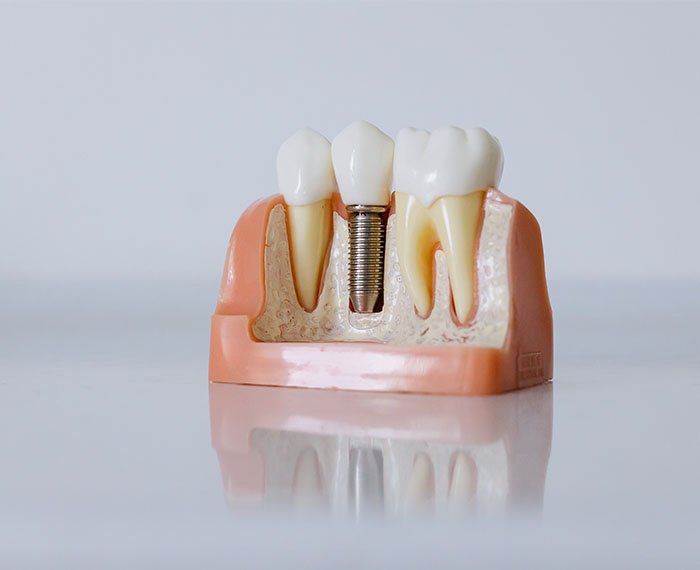
Implant
What is Dental Implant?
Despite all the developments in oral and dental health, many people mostly suffer from dental decay, periodental disease or injury. For many years, the only treatment option for people with missing teeth was bridges and fidelity teeth. However, today there is a brand new, more reliable, more aesthetic and more permanent method.
Dental implants are spare tooth roots. The implants provide a strong foundation for fixed (permanent) or removable artificial teeth made to fit your natural teeth. In other words, an artificial tooth “root” is an artificially placed in your mouth to support dental prostheses such as dental implant, pseudonym or bridge. They are screws made of tissue -friendly titanium and placed on the jaw bone, which serves as a root for missing tooth.
What are the advantages of dental implants?
Dental implants have many advantages:
- Perfect view
Dental implants look like your own teeth and create a natural tooth sensation. Moreover, it is permanent because they are designed to fuse with the bone.
To detail a little more, when it comes to appearance and feeling, the only difference between dental implants and real teeth is that there is no real teeth.
- Fluent speech
In unsuitable prostheses, teeth may slide in the mouth and cause incorrect pronunciation. Dental implants allow you to talk without worrying that the teeth can slide.
- Perfect tooth root
The roots of your teeth are attached to your chin like the root of a tree. When you lose a female, there is a gap where the root is located and these roots are rebuilt with the implant application.
- Ease of eating
Traditional pseudonyms often slide and make it difficult for you to enjoy chewing. Dental implants function like your natural teeth and allows you to enjoy your favorite food without feeling extra effort or pain. It allows better biting force than a person with traditional fidelity teeth.
- Confidence
Dental implants can give back your smile and help you feel better about yourself.
- Oral health
Thanks to dental implants, the forms of neighboring teeth as in bridges do not need to be reduced/changed. Since neighboring teeth are not changed to support the implant, your own teeth remain healthy in your mouth for a long time. With the abutment/ base, which serves as a natural tooth skeleton placed on them, implants allow you to have new teeth without damaging the neighboring tooth. Individual implants also increase oral hygiene and provide easy access between teeth.
- Durability
Bego implants can be used for a long time even for a long time when oral hygiene rules are followed.
- Suitability
Dental implants prevent the discomfort encountered in the removal of prostheses.
What is the success rate in Implant treatment?
The success rates of dental implants vary depending on the place where the jaw is placed, but in general, dental implants have a success rate of up to 98 %. You can use the BeGO Implant for a lifetime with correct care.
Dental implant is suitable for everyone?
A healthy enough to pass through a routine tooth extraction or oral surgery can often be considered suitable for dental implant. It is necessary to have enough bone and healthy gums. Patients should commit to pay attention to oral hygiene after implant and visit dentists regularly. Heavy smoking, diabetes or heart disorders, radiation therapies in the head / neck area should be evaluated individually on a patient basis for implantation. You should definitely contact your dentist to find out if the implant application is suitable for you.
Does the insurance cover the cost of dental implant?
In general, dental implants are not currently within the scope of dental insurance. Depending on your insurance plan and / or the cause of your dental loss, there may also be a special scope. You can direct your detailed questions about this subject to your dentist and insurance provider.
How does Implant Treatment begin?
The first step in the dental implant process is the development of a personalized treatment plan. The plan is for you by your dentist to meet your needs in a medical way.
Then, the tooth root implant, which has a small pole made of titanium, is placed in the bone slot of the missing tooth. As the jaw bone heals, the implant clings safely to the jaw. Implant can be compatible with its superstructure after boiling completely into the jaw bone. The superstructure serves as the skeleton of the Abutment tooth. New teeth / teeth are made on this Abutment.
Your dentist also matches the color of new teeth with your natural teeth. Since the implant is fixed to the jaw bone, spare teeth appear, feel and function as your own natural teeth.
How painful does implant treatment be?
Before the implant operation, the patient is mostly local and in some cases general anesthesia is applied.
Therefore, during the surgical procedure, the patient does not feel pain or pain in any way. In patients with local anesthesia, there may be slight pain after the anesthesia effect is dispersed during the day. These pains are considered normal. This situation is eliminated by using the painkiller recommended by your dentist after the operation. They say that this pain is similar to the pain in normal tooth extraction when asked to patients who have implants later.
How to look at dental implants after treatment?
After implant treatment, it is very important to pay attention to oral hygiene. In addition to routine brushing, the cleaning of the implant area should be provided by using special ropes, interface brushes and mouth shower recommended by the physician. Another important point is to go to checks regularly. The recommended control process is to go to the first two years every 6 months and then to annual controls. The most accurate orientation will be done by your physician.


